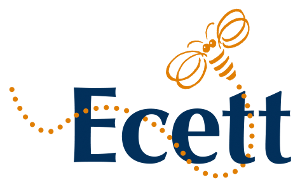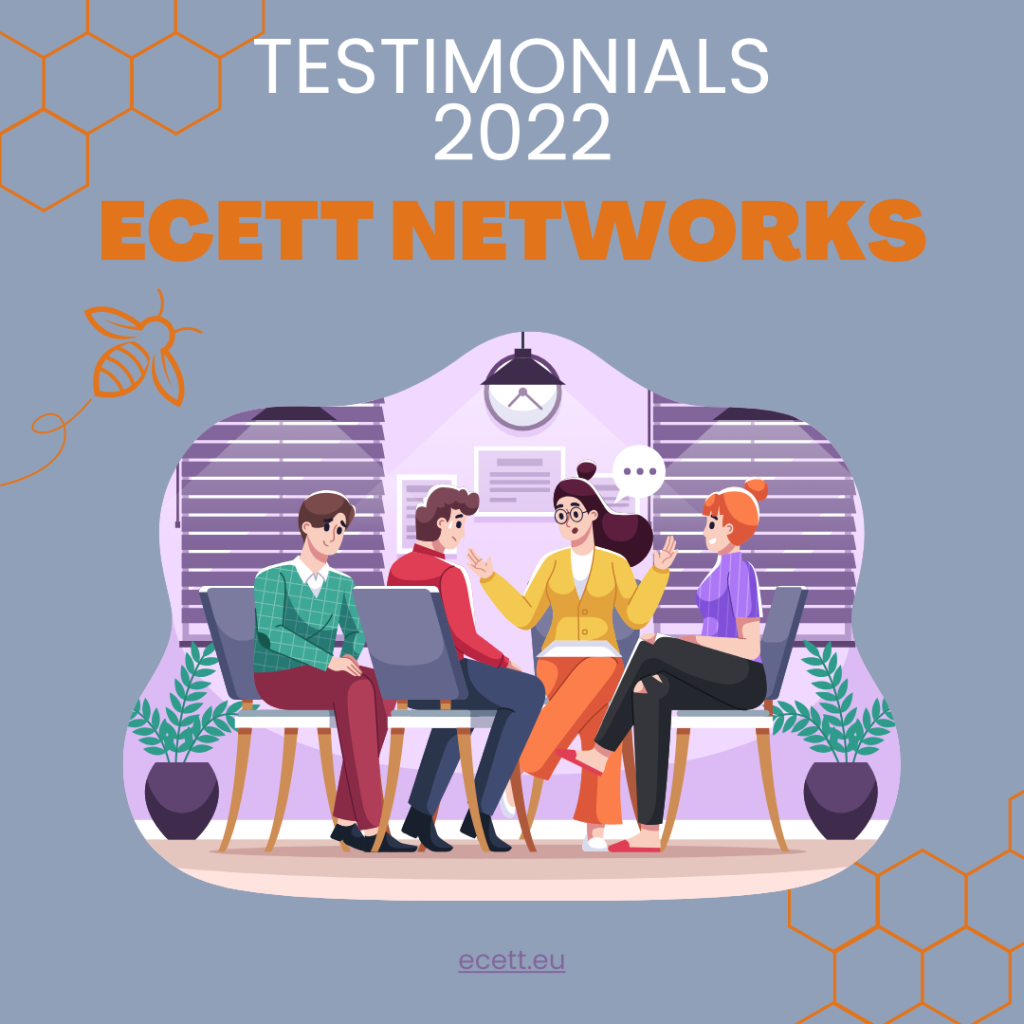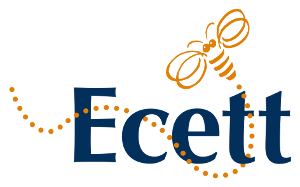Testimonial of trainees after Ecett internships:
“It was an enriching, re-energising and reboosting experience for me, a real solution to burn-out; an intense and enjoyable learning method that I’ll be sure to repeat if the opportunity arises.”
Joshua Aquilina from Caritas Malta after internship at CoolmineTC Ireland
I learnt a lot about Coolmine and their various services offered. It was lovely to see similarities in the services we offer at Malta but also differences and how things are applied differently. There was a great sense of transnational learning especially with having people from different countries also working at Coolmine in addition to it being a Maltese group in Ireland.
The positive output far exceeded my original objectives.
IDEA 1: We need to think more about our clients who are addicted to alcohol and/or cocaine and how we can better cater for them as Coolmine does.
IDEA 2: The concept of love and concern left a big impact on me and the group at large. We would like to carry this idea with us further in our work.
IDEA 3: The community reinforcement approach where all decisions are based within the community and taken as a community was an idea that struck me at the core and at the core of our work.
IDEA 4: Contact with children and family members was an idea that might need re-evaluating in our services after seeing what is done at Coolmine.
Audrey Grant from Caritas Malta after internship at CoolmineTC Ireland
Excellent experience. I achieved all my objectives – learned new trends and tools. I can use these tools for the benefit of my organization. Yes, as I was given the chance to be involved (shadowing) in group facilitation and individual sessions with clients.
IDEA 1: Parents under Pressure training – training to all staff (this would be beneficial to use with our clients)
IDEA 2: Life stories (clients to write and share with others) – to reintroduce the concept of Life stories in their treatment plan.
IDEA 3: Involvement of self help group – to introduce AA, NA meetings while clients are in a therapeutic facility
IDEE 4: Training the staff regularly (without regular training staff can implement bad habits).
Stephanie Grech Caritas Malta after internship at CoolmineTC Ireland
We see concrete follow-up actions to this exchange. Yes following a meeting with all participants of this exchange we are introducing /adding
Different approaches and interventions,
Group Work
More contact with Families of Clients
Re – introduce the Life Story before entering the second phase of residential
Responsibilization on Residents
IDEA 1: The Clients` Life Story upon entering the first phase of residential rehabilitation. This will help the client to reflect on his/her addiction and consequences.
IDEA 2: Introduction to different approaches and interventions
IDEA 3: Additional Group Work
IDEA 4: More responsibility on Client
Nancy Scerri Caritas Malta after internship at CoolmineTC Ireland
Objectives were achieved:
I was exposed to various addiction treatments and different approaches. Especially the female residential programme.
Yes, I received more than expected, It was interesting because I saw how the communities function differently in some approaches. I was particularly impressed with the mother and child programme.
IDEA 1: Re-introduction of the life story before entering the therapeutic community.
IDEA 2: More communication with families especially children
IDEA 3: Introduction of certain groups and seminars
IDEA 4: Put more responsibility on residents.
Marthese Borg Caritas Malta after internship at CoolmineTC Ireland
It was very interesting for me as head of family unit to see how interaction with families in the communities is done. And how family services function outside communities. They have frequent contact with residents.
IDEA 1: Family groups
IDEA 2: Informative Seminars
IDEA 3: Involve more family members to help in community needs when necessary.
IDEA 4: To introduce family groups between family and residents in the community.
Despoina Chatzipapa TC ARGO Greece after internship at De Kiem, Belgium
specific and targeted presentation of employees in the program. All aspects of the program were presented and its operation was analyzed step by step.
IDEA 1: In the entry phase of the program, there are no therapeutic groups,
only individual appointments with the therapist.
IDEA 2: In case of lapse in the reintegration phase, the member is not automatically expelled but an assessment of the diversion situation and conditions is made, by all members.
IDEA 3: Configured accommodation area for mother or father with the child.
The parent attends therapy groups while the child is at school.
IDEA 4: Each member freely decides whether to go to the therapeutic community or to continue his treatment at the ambulatory center
Erini Grigoriadou, TC ARGO Greece after internship at De Kiem, Belgium
IDEA 1: Although De Kiem offers a residential therapeutic community program, all its philosophy and therapeutic practices are very modern and updated, far from the traditional therepautic communities for drug users.
IDEA 2: A very important support that De Kiem offers is the TIPI House – a house for (mainly) women but also single addicted parents that have children and cannot afford babysitting or cannot combine work and therapy.
So, TIPI is a safe place where mothers can stay with their children as long as they are members of Therapeutic Community. This is a very important practice to support a very sensitive group, addicted women with children, and to keep them clean, active in work and therapy and together with their children.
IDEA 3: A relapse while in ReEntry House is not a reason to expel a member, but a very good opportunity to think deeply on a personal and group level about its therapy and progress.
IDEA 4: Education/ trainings/ specializations in different therapeutic techniques for the staff members is completely paid by the state and with the mediation of the organization itself, not by themselves on a private level.
Jacques Hansenne, CT l’Espérance, Belgium, after training at Sauvegarde du Nord, France
The organisation was perfect. We were very well received. We learnt a lot about the way they run a therapeutic community. Some of what we learned could be transferred directly here, while others could be transferred after adaptation and consultation with our teams. The experience was rich in meetings: staff and residents. Our common thread ‘cognitive revalidation’ allowed us to follow our objectives. All the exchanges contributed to the improvement of our cognitive rehabilitation.
I learned a lot about their organisation, their tools, their vision. All this learning will be useful for us to update and reconstruct a new therapeutic project in the light of the cognitive aspects.
IDEA 1: Their cognitive revalidation programme which is part of a university study whose overall project is called ‘Neuroaddict’. The revalidation modules, the academic supervision, the results to be obtained are useful tools for all therapeutic communities.
IDEA 2: Awareness in all teams that the programme, explanations and tools need to be adapted to the cognitive limitations of the patients. Color coding, drawings and pictures are used a lot.
IDEA 3: Simplicity and sobriety of procedures, rules, explanations.
IDEA 4: The phasing of their programme
Mélanie Jean, CT l’Espérance, Belgium, after training at Sauvegarde du Nord, France
This trip perfectly met my objectives as it allowed me to discover the NeuroAddiCT project (neuropsychological remediation programme).
I was also able to exchange with the neuropsychologist of the center and discover new tools of cognitive remediation that she uses.
We were able to discover how the organisation of community life there is adapted to cognitive difficulties.
In addition to the objectives we came with, we were able to reflect on the functioning of our center in a much more global way and discover another atmosphere/work rhythm.
Micaëlla Clément and Bruno Woomed from Etoile d’Espérance (Mauritius), after visit of TCs Trempoline and Phénix (Belgium) and AURORE (Paris, France).
The 3 TCs agree on 3 principles:
the strength of the group, the strength of the residents and trainees among themselves, never find solutions for them, always refer to the group!
Mandatory complete weaning before treatment
Mixed support (men and women)
Our objectives were achieved. We realized when we visited these 3 facilities that we had totally deviated from the TC programme. We faced our reality by visiting these facilities
What particularly touched me was to see the dynamics of the house, how the residents know how to fill their days with well established tasks in the different sectors of activity. They do it without complaining and most importantly, they understand the meaning of these tasks,
We received more than our initial objectives. I got answers to my many questions and by coming to the place, I could see and understand the sense of commitment, respect, therapeutic rituals, discipline and autonomy of the trainees.
Niki Panou from ARGO (Greece) after internship at De Kiem (Belgium)
During my training, I had the opportunity to visit De Kiem’s Welcome House, the therapeutic community, the Tipi house and the Outpatient program in Ghent. I participated in the daily activities and in therapeutic groups of the TC and discussed with my peers about the philosophy and the context of their organization.
I will discuss many of the practices that I witnessed during my training, in order to examine their possible implementation in my work. Also, because of the personal relations that were formed, it is now easier to work together with this organization in the future.
Petra Cermakova from Magdalena (Czech Rep.) after visit of CEID Bordeaux (France)
I understand now how the organization works in public relations, how the organization works with the local community. The organization communicates the positive impacts of its work. It recommends pointing out professionalism (specialists in addiction) and publishing specific stories of clients – patients (ideally in major media, e.g. in TV news).
The organization works with young people. Young people help the organization in the Hang-Over café/Caan’abus café project. However, this is not volunteering in the true sense of the word. Young people gain experience, training, and at the same time receive a small financial reward for the time and help they give to the organization.
This is an inspiring approach for our organization. We also believe that it is important to come up with a win-win solution for long-term cooperation with volunteers.
Thanks to the internship, I also learned about a grant to finance volunteers.
Great importance is seen in “networking”, in knowing contacts. The organization focuses on large media, on the current government, on representatives of the cities where it has branches, on large corporations with their own resources.
When they negotiate with large companies, they always offer to negotiate directly with the director of their organization. Director deals with director, all at management level.
They also recommend devoting limited time to fundraising at the level of smaller entities or individual donors. See uncertain result.
However, different starting conditions also need to be taken into account. In France, they are asking the state for financial support for 15 years. In the Czech Republic, we only apply for 1 year, so every year we are in a financial uncertainty, which limits us. In France, some entities are obliged to contact NGOs and jointly ensure the minimalisation of risks (see e.g. festival organizers). Another difference is the fact that in France it is not certain whether donations will be tax deductible. There is always a 6-month wait to see if the issue is of “general interest”.
The representatives of the organization answered all my questions. I received some photos, thanks to which I could better prepare a presentation about my internship abroad.
Martin Kalous fom Magdalena (Czech ep.) after visit of CoolmineTC (Ireland)
Objective 1: What is the relation between occupational therapy and group psychotherapy. – TC has similar problems with bringing this type of reflection into groups.
Objective 2: Somatic diseases as contraindication for participating in daily TC program – TC has a different team of specialists, so they have this area covered by nurses etc.
Objective 3: Sanctions/points systems with clients in TC – although my TC is democratic, and Coolmine´s are more hierarchic, they have quite interesting sanction system, and i like to implement some of theirs stuff
I received more than my initial expectations. More insight to management of service and connection between services of the same organisation.
Nikiti Panselina from ARGO (Greece) after visit of De Kiem (Belgium)…
The objective of rehabilitation of drug addicts leading to autonomous living was very well achieved as I visited the welcome house and the therapeutic community. The objective of social reintegration of drug addicts leading to autonomous living was well achieved as the trainer presented the procedures leading to social reintegration but I didn’t have the chance to visit the re-entry house. The objective of daily pedagogical work was very well achieved as I observed a Tipi group.
I received more than expected: the special support and care that receive mothers and fathers. Their possibility to leave with their children in the Tipi house while they’re doing rehab.
?? de Trempoline, après …?
« Ce fut pour moi une expérience enrichissante, redynamisante et reboostante, véritable solution au burn-out ; une méthode d’apprentissage intense et agréable que je ne manquerai pas de renouveler si l’opportunité s’en présente. »
Allison, Antonietta, Laura & Sébastien from CRF ALBA (Belgium) after visiting C2RL in Limoges (France)!
The Belgian team at CRF ALBA would like to thank C2RL for your impeccable welcome, your kindness and your friendliness! We were welcomed like kings by a very friendly and highly professional team! We felt right at home and the programme you prepared for us was perfect! We came away with lots of good ideas for how to improve our day-to-day work with our beneficiaries. Watching your work was very rewarding for us! We’ll be passing on to you the “good practice” that we’d like to develop here.
Don’t hesitate to take advantage of the European grants, and if you’d like to come and find out about our work in La Louvière, you’re very welcome!
We don’t have everyone’s e-mail address, so we’re counting on you to pass on this message to all your colleagues.
Allison, Antonietta, Laura & Sébastien de CRF ALBA (Belgique) après visite de C2RL à Limoges (France)
L’équipe belge du CRF ALBA, tient à remercier C2RL pour votre accueil impeccable, votre bienveillance et votre gentillesse! Nous avons été reçus comme des rois par une équipe très sympathique et hyper professionnelle! Nous nous sommes sentis comme chez nous et le programme que vous nous avez préparé était parfait! Nous sommes revenus avec plein de bonnes idées pour tenter d’améliorer encore notre quotidien auprès de nos bénéficiaires. Observer votre travail a été très riche pour nous! Nous vous transmettrons d’ailleurs la “bonne pratique” que nous souhaitons développer ici.
N’hésitez pas à profiter également des bourses européennes et si vous souhaitez venir découvrir notre travail à La Louvière, vous êtes les bienvenus!
Nous n’avons pas les adresses mail de tout le monde et nous comptons sur vous pour transmettre ce message à tous vos collègues.
1000 mercis !!!!!!



